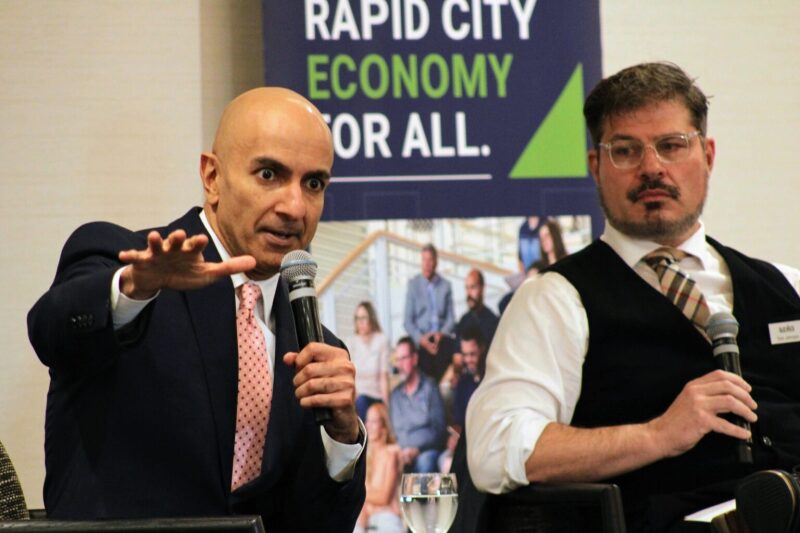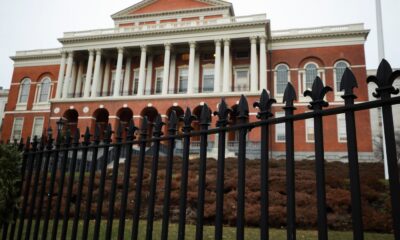Business
Federal Reserve Official Warns Tariffs Complicate Inflation Efforts

During a recent event in Rapid City, South Dakota, Neel Kashkari, president and CEO of the Federal Reserve Bank of Minneapolis, addressed the complexities of managing inflation in light of recent tariff policies. Speaking to an audience gathered at the Hyatt Place on March 15, 2024, Kashkari remarked that while the Federal Reserve was making progress in controlling inflation, tariffs had introduced significant challenges.
Kashkari explained that tariffs, taxes imposed on imported goods, have created uncertainty in the economy. He noted, “The impact of tariffs on the economy is taking longer to be felt than I would have guessed when they were announced.” This delay is partly due to businesses utilizing existing inventories to mitigate the immediate effects of tariff-induced price increases. “But as that inventory gets worked down, they have to replenish it,” Kashkari added, indicating that the true impact on prices may become more pronounced in the coming months.
Global Market Disruptions
The agricultural sector is already experiencing the effects of heightened tariffs, particularly concerning the U.S. soybean market. In response to a question about China’s boycott of U.S. soybean imports, Kashkari highlighted how the global marketplace is shifting. “What’s happening is you’re seeing other countries respond by growing more beans,” he stated, noting that increased supply from other nations could have lasting implications for soybean prices. He cautioned that disruptions in established supply chains, originally designed for shipments to China, complicate the situation further.
Kashkari emphasized the limited role the Federal Reserve can play in directly assisting affected farmers, explaining, “All we can do is try to keep inflation in check, and it really is a question for our elected leaders and for fiscal policy to try to address.” The Federal Reserve has been focused on bringing inflation down to a target rate of 2%, while the personal consumption expenditures price index, a key measure of inflation, peaked above 7% in the previous years before falling to 2.3% in April, only to rise again to 2.7% recently.
Interest Rates and Economic Outlook
In recent months, the Federal Reserve has adjusted its key interest rate, lowering it from approximately 4.3% to 4.1% for the first time this year. Kashkari supported this decision, suggesting that further reductions may be considered as the year progresses. “I think the risk of inflation is more one of persistence,” he said, predicting that inflation might stabilize around 3% for an extended period rather than spiking dramatically.
During the Q&A session, Kashkari addressed various concerns raised by attendees, including the impact of political pressures on the Federal Reserve’s operations. He stated, “The best thing we can do when we face political uncertainty is to do our jobs to the best of our ability, leaving politics at the door.” He expressed confidence that maintaining this focus would enhance the Fed’s credibility with the public.
On the topic of technological advancements, Kashkari shared his views on artificial intelligence, expressing a cautious optimism. He noted that while he sees long-term potential in AI, he remains skeptical about short-term predictions of mass layoffs due to technological integration.
Addressing immigration, Kashkari pointed out that productivity and population growth are critical for economic expansion. He stated, “Without the latter, you’re going to have slower growth unless you decide to embrace immigration. And that’s just math.”
When discussing housing affordability, he highlighted the importance of increasing housing supply in conjunction with any interest rate cuts to prevent home prices from escalating further. “Localities need to look at what can you do locally to try to remove some of the barriers that are preventing more supply from coming in,” he advised.
Despite consumer pessimism regarding the economy, Kashkari observed a disconnect between public sentiment and spending behavior. “For the last three years, consumers have said, ‘The economy stinks. I’m gloomy as heck,’” he noted, yet they continue to spend significantly on entertainment and travel, indicating a complex economic landscape.
This event was organized by Elevate Rapid City, a local economic development group, and reflects ongoing discussions about the multifaceted challenges facing the U.S. economy. As the Federal Reserve navigates these complexities, the impacts of tariffs and broader economic policies will continue to evolve, shaping the financial landscape in the months ahead.
This story was originally published on SouthDakotaSearchlight.com.
-

 Science1 week ago
Science1 week agoResearchers Challenge 200-Year-Old Physics Principle with Atomic Engines
-

 Politics1 week ago
Politics1 week agoNHP Foundation Secures Land for 158 Affordable Apartments in Denver
-

 Health1 week ago
Health1 week agoNeuroscientist Advocates for Flag Football Until Age 14
-

 Lifestyle1 week ago
Lifestyle1 week agoLongtime Friends Face Heartbreak After Loss and Isolation
-

 Health1 week ago
Health1 week agoFDA Launches Fast-Track Review for Nine Innovative Therapies
-

 World1 week ago
World1 week agoGlobal Military Spending: Air Forces Ranked by Budget and Capability
-

 Politics1 week ago
Politics1 week agoIsraeli Air Strikes in Lebanon Kill One, Wound Seven Amid Tensions
-

 World1 week ago
World1 week agoTroops to Enjoy Buffalo Chicken, Thai Curry in 2026 MREs
-

 Business1 week ago
Business1 week agoMaine Housing Inventory Surges to Post-Pandemic High
-

 Top Stories1 week ago
Top Stories1 week agoUnforgettable Moments: The Best Victoria’s Secret Performances
-

 Business1 week ago
Business1 week agoSpirit Airlines Cuts Workforce with Furloughs for 365 Pilots
-

 Politics1 week ago
Politics1 week agoMassachusetts Lawmakers Resist Audit After Voter Mandate









